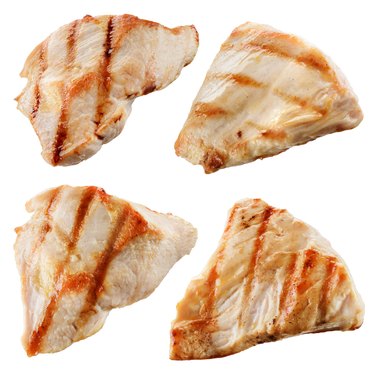
Despite being high in fat, low-carb diets not only help you lose weight, but also improve heart health. Some people do, however, experience an increase in cholesterol levels when they switch to a low-carb diet, whether it's due to rapid weight loss or a genetic predisposition to high cholesterol. While you don't necessarily need to restrict fat and cholesterol on your low-carb diet to improve levels, including leaner protein choices and adding healthy plant fats may help. Be sure to talk to your doctor before starting your low-carb, low-fat, low-cholesterol diet to discuss the plan and how best to monitor progress.
Low-Carb, Low-Fat Diet Basics
Video of the Day
Most low-carb plans limit your intake of carbs to 150 grams or less a day, and many limit you to 20 to 50 grams during the early stages of the diet to help you lose weight quickly. These diets help you lose weight by upping your body's fat burning through ketosis -- when your body burns fat for fuel instead of glucose -- and by decreasing hunger. When limiting carbs to such extremes, food choices usually include animal meats; low-carb veggie proteins such as tofu; low-carb veggies such as spinach; and mushrooms, cheese, fats, nuts and seeds. Many of the popular low-carb weight-loss plans use net carbs for carb counting, which subtracts indigestible fiber from the total carb count.
Video of the Day
A low-fat diet generally restricts intake to 25 to 35 percent of calories. When restricting your carbs and fat, you'll have to make some adjustments to your typical low-carb diet, which means leaner meats and less cheese and fat.
Healthy Protein Choices for Better Cholesterol
When it comes to cholesterol, it's the saturated fats in meat you need to be concerned about. High-fat meats such as marbled red meat, bacon and chicken skin, as well as cheese, are sources of saturated fat. To help improve cholesterol levels, replace high-fat meat and cheese with leaner cuts of red meat such as sirloin and pork loin, white meat poultry and seafood. Vegetarian sources of protein also make good choices.
Eating more fatty fish may help lower cholesterol levels. Omega-3 fatty acids are essential fats linked to better heart health, including lowering both cholesterol and blood pressure. Be sure to add salmon, tuna, mackerel and sardines to your low-carb diet, even if it ups your total fat intake.
Eggs are virtually carb-free, but high in cholesterol. However, the cholesterol in food, including eggs, doesn't affect your blood cholesterol levels as once thought. Because all the cholesterol is in the yolk, if you have high cholesterol or a history of heart disease, it's recommended that you limit your yolk intake to three times a week, according to the Harvard School of Public Health. There's no restriction on egg whites.
The Right Fats and Soluble Fiber
Butter, lard and cream may be carb-free, but like marbled meats, they're high in saturated fat. Replace these fats with vegetable oils such as olive or soy oil. Also, nuts, seeds and avocados make healthier fat choices, but they're also a source of carbs, with 1 to 3 grams of net carbs in a 1-ounce serving of nuts or seeds, or in half an avocado. When restricting fat intake, use these foods sparingly.
In addition to being good sources of healthy fat, avocados, nuts and seeds are also rich in soluble fiber. This type of fiber can help lower blood cholesterol levels naturally. Other low-carb foods rich in soluble fiber include Brussels sprouts, asparagus, turnips, broccoli, eggplant and collard greens.
Putting It All Together
If you're on a 30-gram-carb diet that's low-fat and low-cholesterol, you might have an egg-white omelet filled with 1/2 cup of cooked spinach and 1/2 cup of mushrooms with 1 cup of fresh raspberries for breakfast. For lunch, consider roasted skinless turkey breast served with 1 cup of steamed kale seasoned with fresh lemon juice and 1 cup of romaine lettuce topped with 1 teaspoon of olive oil and red wine vinegar. Keep mid-afternoon hunger away with 24 raw or roasted unsalted almonds. Broiled salmon with 1/2 cup each of steamed broccoli, steamed cauliflower and steamed Brussels sprouts makes a good low-carb, low-fat healthy dinner meal. Enjoy a cup of mixed greens topped with diced chicken and 2 tablespoons of balsamic vinaigrette as an evening snack.
- Today's Dietitian: Low-Carb Diets — Research Shows They May Be More Beneficial Than Other Dietary Patterns
- Authority Nutrition: What to Do If a Low-Carb Diet Raises Your Cholesterol
- American Journal of Clinical Nutrition: Low-Carbohydrate Nutrition and Metabolism
- American Academy of Nutrition and Dietetics: Fat-Restricted Nutrition Therapy
- American Heart Association: Saturated Fat
- Atkins: Atkins: How It Works
- University of Maryland Medical Center: Omega-3 Fatty Acids
- Atkins: What Are Net Carbs?
- Harvard School of Public Health: Eggs and Heart Disease
- Atkins: Carb Counter
- Today's Dietitian: A Soluble Fiber Primer — Plus the Top Five Foods That Can Lower LDL Cholesterol
- Dietitians of Canada: Food Sources of Soluble Fiber